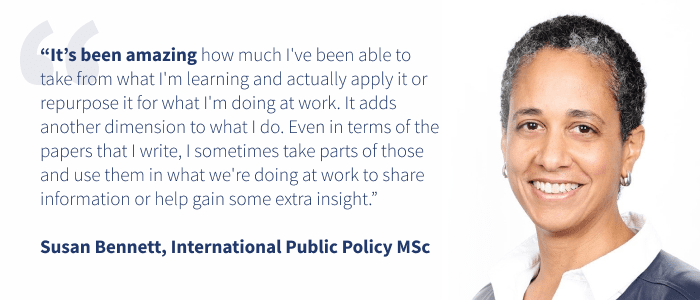Currently residing in Singapore, Susan Bennett in an engineer by training who works within a pharmaceutical company. With experience within telecommunications, information technology, and artificial intelligence, her work has taken her across Europe and the US. She’s now earning her MSc in International Public Policy, one of the part-time courses offered by Queen Mary Online.
“One of the reasons I was attracted to this programme in particular is because of an interest I’ve had since my 20s around public policy, particularly public administration. I want to be somebody who understands these systems and how they shape our behaviours. Especially being in pharmaceuticals, you can imagine the complexity of the policies that affect our business,” she explains to us over a Zoom conversation.

Learning online
Susan points to her demanding career as a reason for opting for a degree that can be taken online. With about 50% of her time at work involving travel to Europe, Susan decided that an online programme would be the best way to further her education. “I love Canvas, which is the online learning platform we use,” she shares. “I’ve been doing online learning for over 20 years in some shape or form. It’s definitely one of the better experiences.”
“The platform is great in terms of how it structures lessons, asks questions, and allows us to interact in forums. It’s more of a curated process, which is fantastic. We also have webinars and can engage in conversations with the tutor. I really, really appreciate our tutors; they facilitate our entire online experience, mark papers, answer questions, and have been super helpful. There’s so much feedback provided in the papers to help us improve how we write and reflect on the materials given to us.”
Find out more about learning online in our interview with Queen Mary student Padraig:
A global community
When talking about her fellow course mates, Susan has even more warm words. Describing how they’ve come together, she says, “It’s very cool to form additional bonds and have offline conversations. We’ve formed WhatsApp groups, which enable us to text back and forth and ask questions more asynchronously. And it helps that we can chat at different times of the day, because there seem to be students from everywhere – from Africa to Korea, to the UK and Brazil!”
Breaking down what a typical study week looks like for her, Susan explains that she prefers studying for about two hours a day during the week, with an additional six to eight hours across the weekend. “During the week I do a lot of reading, and I’ll respond to module questions posed on the forums. When papers are approaching, I spend more time over the weekend to do additional reading, assessing, and writing.”
Career benefits
Susan also notes that her course has already introduced some noticeable benefits in her career. “It’s been amazing how much I've been able to take from what I'm learning and actually apply it or repurpose it for what I'm doing at work,” she reveals. “It adds another dimension to what I do. Even in terms of the papers that I write, I sometimes take parts of those and use them in what we're doing at work to share information or help gain some extra insight.”
Getting the balance right
At the end of our conversation, when asked about what it takes to earn a degree while juggling other commitments, Susan’s answer is simple: patience. “It’s like learning a new language. You have to care about what you’re doing and engage with the materials. And that means being patient with yourself. It can be frustrating reading some of the papers and feeling like every sixth word is a new word. But you need to learn those terms and their distinctions. So you have to stop and pause, check your resources or look at Google. And then it gets easier over time. Be patient, be passionate.”
Get a firm grasp of the decision-making and implementation processes involved in international public policy with our part-time, online MSc:
.png?width=280&height=74&name=logo%20(1).png)



 Follow us on Twitter
Follow us on Twitter Like us on Facebook
Like us on Facebook